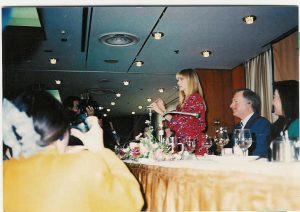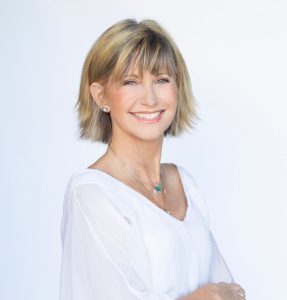When I learned that Olivia Newton-John had passed away at 73 Monday after a 30-year battle with breast cancer, my mind returned to January 29, 1990, when I had the privilege of meeting the renowned singer and spending a little time with her.
Olivia Newton-John was in Tokyo for a concert, and she graciously accepted an invitation to be the star attraction during a professional luncheon at the Foreign Correspondents Club of Japan.
At the time, I was the vice-president of the FCCJ, and because Mike Tharp, the president, and U.S. News & World Report correspondent, was away from Japan on assignment, it fell on me to preside over Newton-John’s visit.
For those unfamiliar with the Foreign Correspondent’s Club of Japan, perhaps I should provide a little background on the place. The FCCJ was founded in 1945 and has been a haven for working journalists in Japan ever since. At its height, the FCCJ had some 1,500 associate members and about 450 professional journalist members. The FCCJ served as Japan’s surrogate national press club for much of its lifetime. It has hosted presidents, prime ministers, athletes, actors, authors, and pop stars such as Sting and Olivia Newton-John.
Suffice it to say, the dining room was packed for Olivia Newton-John. It could typically seat some 300-400 guests, and that day the place was bursting at the seams.
I met Ms. Newton-John at the door and escorted her to the head table. My job that day was to introduce her to the gathering. Lunch was served, and she and I engaged in some small talk.

I arranged to broadcast a playlist of Olivia Newton-John’s songs over the club’s speaker system—a fact she immediately noticed.
“Wow, I hope we don’t drive everybody out of the place,” she quipped.
“Anybody who leaves will be excommunicated,” I said.
She laughed and asked me for what news organization I worked.
“The Chicago Tribune,” I replied.
“Oh, I love Chicago. One of my favorite cities. I love the Magnificent Mile.”
I agreed. Then, I said one of my aunts was from Brisbane, Australia.
“Really? That makes you an honorary Aussie!”
“Thanks. Does that mean you will be stamping my passport?”
Newton-John laughed. “Sure! Hand it over!”
Unfortunately, I didn’t have my passport with me, so I moved on to another topic.
While researching Olivia’s background and family history, I discovered that her maternal grandfather was none other than the Nobel Prize-winning physicist Max Born.
I told her that I had learned that Born helped establish the Institute of Theoretical Physics at Göttingen University in the 1920s, that he coined the term “quantum mechanics,” and that he was also a friend of Albert Einstein.
“You have done your homework, Ron,” she said.

I wasn’t finished.
For a Jewish family in Germany on the cusp of the rise of the Nazi regime, the future of Born and his wife and children — including Newton-John’s mother Irene — was not very bright. In his memoirs, Born recalled the situation in Germany going from bad to worse. After Adolf Hitler came to power, he instituted an official “boycott” of Jewish citizens. Concentration camps soon followed, and Born began plotting his escape.
By May of 1933, Born was stripped of his position at Göttingen University, and his family was forced to flee Germany to England just ahead of the Nazi pogroms. Born didn’t return to Germany until 1954, when he had already contributed further work in quantum mechanics, solid state physics, and optics. That same year, he won the Nobel Prize in Physics “for his fundamental research in quantum mechanics, especially for his statistical interpretation of the wave function,” sharing the prize with fellow German Walther Bothe.
I learned a lot more about Newton-John’s father, Brinley “Brin” Newton-John, but I didn’t want to spend the entire meal reciting her family history.
Nevertheless, I was fascinated to learn that her father was an intelligence agent for Britain’s MI5, was a fluent German speaker, and spent much of the war interrogating German POWs. But the most fascinating thing I discovered about Newton-John’s father was that he helped break the Nazi Enigma codes, in which all top-secret German communications were encrypted. These codes used a complex electrical device; an Enigma machine thought to be unbreakable. Brinley Newton-John was part of the top-secret team that worked for months to prove them wrong.
“What an amazing family history you have,” I said. “With that background, I’m surprised you didn’t become a physicist or an intelligence operative.”
“Oh please,” Newton-John replied. “I am terrible at math and even worse at keeping secrets.”
When it came time for me to introduce Olivia Newton-John to the audience, I said I knew how she came up with the title of her 1981 hit song “Physical.”
“After all, her grandfather was (wait for it) a physicist,” I said.
I don’t recall how that line went over with the audience. There may have been a few groans; if not, there should have been.
But to her credit, when I returned to the head table and sat down next to Olivia Newton-John, she turned to me laughing and said:
“Well, that’s a first. Nobody has ever made THAT connection before. My grandfather must be chuckling at that one.”
Of course, I had heard the song “Physical” many times, and we all know that Olivia Newton-John was not singing about quantum physics.
The song had what was considered excessively suggestive lyrics and was even banned on some radio stations.
“That song got me into a little trouble,” Newton-John said.
“Yes, but I learned that “Physical” spent ten weeks at No. 1 on the Billboard pop charts,” I said. “And eventually, it was named the biggest song of the 1980s. That’s the kind of trouble I think most folks would love to have.”
After an hour-long Q & A session with the audience, Olivia Newton-John graciously signed a few autographs. Then, I walked her to the door.
“Thank you,” she said as we shook hands. “It was a lot of fun.”
I never saw Olivia Newton-John again, but I had the distinct feeling that she didn’t have a vain bone in her body.
To me, she was the quintessential “girl next door.”
[If you enjoyed this post, please consider subscribing to ForeignCorrespondent and tell your friends to subscribe. IT’S FREE! WHAT A DEAL! If you’ve received this from a friend and would like to be added to our distribution list for future blog posts, please enter your email address in the sign up for notifications box on the right side of this post or at: https://ronaldyatesbooks.com/category/foreign-correspondent You can also find my commentaries on the American Free News Network at https://afnn.us. And please feel free to comment. WE LOVE COMMENTS!]


What a wonderful warm post, Ron. I love this beautiful memory with a beautiful soul. Thank you for sharing!
Thanks, Jan. There are some people we just never forget! She was one of those for me.
Such a wonderful slice-of-life homage. This short piece gives a better appreciation of the lady than a full-blown biography would.
Thanks, J.C. She was a delightful woman and clearly unforgettable.
I enjoy your reflections, Ron. I always loved her performances and had the feeling she was. regular person. Her family background probably molded that attitude.
Your impression of Olivia Newton-John is sound, John. She was a regular gal!
Great story, Ron. Hope you are well!